Graduate
Child Clinical Graduate Student Named Doris Duke Fellow
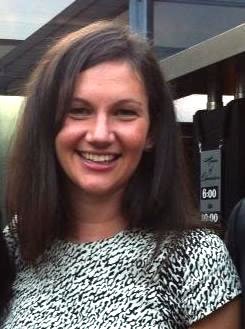 |
| Photo: Charlotte Heleniak |
Charlotte Heleniak, a fourth year Child Clinical student with Kate McLaughlin, has been awarded a Doris Duke Fellowship for the Promotion of Child Well-Being by Chapin Hall at the University of Chicago in collaboration with the Doris Duke Foundation. These extremely competitive fellowships are designed to identify and develop a new generation of leaders interested in and capable of creating practice and policy initiatives that will enhance child development and improve the nation's ability to prevent all forms of child maltreatment. Read on to learn about our latest award-winning student:
Let's start with the basics, where are you from and where did you complete undergrad/masters?
I was born in Hong Kong, but grew up in Manhattan. I completed my undergraduate education at Dartmouth College in Hanover, New Hampshire.
How did you wind up at UW/why did you apply here? What do you think about living in Seattle?
My road to graduate school was unusual – I didn’t even major in psychology at Dartmouth! However I was drawn to work focused on improving the lives of families touched by chaos and violence. So, following my graduation I worked as a counselor in a group home for teens in contact with the legal system and as an advocate for families of individuals arrested for domestic violence in the Brooklyn District Attorney’s office. It was during my time at the DA’s office that I grew frustrated with the scope of my work, as there were so many bigger picture issues that I was unable to understand or address in my time-limited contact with families. So two years out of college I decided then to pursue a career in child clinical psychology research. I found a position working in child psychiatry at Columbia University to get exposure to the research process, and loved working there for two and a half years prior to graduate school.
I landed at University of Washington’s child clinical psychology program because I knew I could gain excellent training in a diverse range of behavioral and biological methods to apply to my study of how adverse environments might shape adolescent behavior. The UW child clinical faculty is so impressive, it was just too hard to say no to this opportunity even though I was nervous about moving across the country.
Moving from New York to Seattle was a huge transition for me. I think that my first week of graduate school was the most flustered time of my life. I remember that on my first day of school, I planned to pick up a cup of coffee on my way to the bus, then bus to school. Pretty straightforward, right? But my estimate of how long it would take was SO hilariously off. I stopped in my local coffee shop, saw only one person in line, and anticipated leaving with my cup of joe shortly thereafter. Five minutes and a lengthy conversation on the health benefits of almond milk later, I ordered my cup of drip coffee. I was lampooned by the barista for talking too quickly when I ordered. Another five minutes and a slow pour-over later, I was finally on my way. Then I waited, and waited, and waited (or so it felt) for the bus. It turns out that in Seattle, the buses don’t run once every minute as my old NYC subway had during rush hour. Looking back, this snapshot of adjusting to life in Seattle really makes me laugh.
I totally love it here now. This is the perfect city for a graduate student. Happy hours make eating out at nice restaurants affordable, coffee shops everywhere mean that my office is wherever I would like it to be. People are kind and friendly. And I have become a (slightly) more patient person ;)
What is your research interest and how did you get into it (what inspires/motivates you)?
I am interested in how adversity, specifically exposure to violence, influences the onset and maintenance of psychopathology in adolescence. This interest is a natural extension of my work in the group home and Brooklyn DAs office. In addition, one of my aims in graduate school has been to learn new biological methods for studying the mechanisms underlying this process. This is inspired by my time working in a psychiatry lab where I learned the importance of understanding the biological vulnerability to and expression of child and adolescent psychopathology. I continue to be inspired and motivated by my advisor, Kate McLaughlin, who is now training me in the use of cognitive neuroscience methods for my research aims.
How did you learn about your funding opportunity and tell us about the application/waiting process?
The chair of our department, Sheri Mizumori, sent an email around to the child clinical faculty about the fellowship, and Kate then let me know about it. The fellowship application is unique in that it asks fellows to identify both an academic mentor who assists fellows conduct their dissertation research and a policy mentor whose role is to shape the fellow’s research for maximal policy impact. The application requires a comprehensive plan to support these big picture aims, and letters from each mentor. Finding a policy mentor was intimidating at first, but I am so grateful to have this incredible opportunity to get connected with leaders in policy in the Seattle area. At this point in my career, I hadn’t considered what role I may have in shaping policy in the future, let alone now as a graduate student. Several months after the application deadline, top applicants are invited to participate in a telephone interview conducted by a small group of the fellowship’s Board of Directors. I learned that I received the fellowship within a week of the interview.
How did you feel when you learned that your application was accepted and that you will receive funding?
My advisor, Kate, texted me that she had just learned I received the fellowship. I think my reply was “WHAT.” I was stunned then thrilled. One of my goals in graduate school was to learn how to write a grant application. It’s an important skill in and of itself, and critical for a research career. But of course, I know how competitive awards of this nature are. I hadn’t anticipated that I might actually get it!
Do you have any advice/tips/suggestions for others who may apply to this opportunity? About graduate study in general?
Apply! In academia I sometimes feel like each lab is its own island, and it is easy to be myopic about my research, not considering how it fits into the big picture. This fellowship provides an incredible opportunity to meet graduate students from a diverse range of fields (e.g. social work, education, law) who are all working to promote child well-being and eradicate maltreatment, and to connect with experts in research and policy in this area through a network of mentors that the fellowship fosters. Doris Duke fellows meet several times yearly to generate new ideas and work together on projects. The application itself helped me to make new connections with local policy leaders that I would never have met otherwise. Talking to them helped me consider new perspectives on my research. So, even if you do not apply to this opportunity, my advice to other students is to find ways to get connected with policy here in Seattle as it can help us to better shape our research so that it can make the biggest difference.
What do you hope to accomplish with the funding and/or while in the UW Psychology graduate program?
I am so excited to have this opportunity to broaden my understanding of child maltreatment by learning from my incredible group of peers and their mentors in a range of disciplines that I am less familiar with. I hope that our conversations together over the next two years will foster new collaborations that generate important information that everyone can use, from the courts to the ivory tower.
I am also really looking forward to immersing myself in the policy work that is happening here in Seattle, through working with my policy mentor, Lucy Berliner.
What do you like doing in your spare time?
I try to take Saturdays off from work whenever I can, it is so important to recharge and have some fun. Lately my boyfriend and I like to do “Treat Yourself Saturdays” where we pick a neighborhood in the area to explore and plan fun activities like checking out the local microbreweries, museums, and restaurants. Every Saturday has become a mini Staycation.
The last book and/or movie you saw and enjoyed?
I am finally reading I Know Why The Caged Bird Sings by Maya Angelou. She is an incredible storyteller. Each time I pick up the book I feel totally transported to another era, while thinking about how sadly similar it still is to what is going on in the country today.
What you plan to do once you complete your PhD?
Celebrate! This is one long haul. And get a job ;)
Supplemental Reading:
- Doris Duke Fellowships for the Promotion of Child Well-Being
- Grants and Funding Information Service (GFIS) through the UW Libraries.
HINTS Lab at the Shoreline STEM Festival
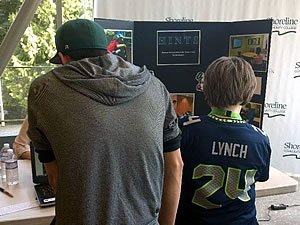 |
| Photo: Hints |
The Human Interaction with Nature and Technological System (HINTS) Lab, directed by Peter H. Kahn, Ph.D., was a featured exhibitor at the Shoreline STEM Festival, held on Saturday, May 9, 2015 at the Shoreline Community College. The exhibit showcased the lab’s major human-robot interaction research projects that studied people’s social and moral relationships with humanoid robots that are designed to look like and interact with people in human-like ways, and also the lab’s most recent research that investigated whether human creativity can be enhanced thorough human-robot collaboration.
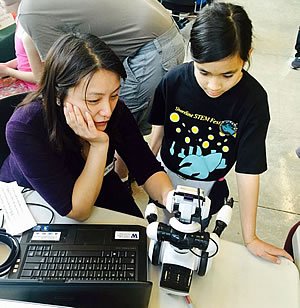 |
| Photo: Solace Shen and Tanya Wickham |
Solace Shen, a Ph.D. Candidate in developmental psychology, and Tanya Wickham, a Psychology undergraduate research assistant, engaged the visitors in the exploration of research questions such as: Do people perceive of robots as having moral standing? Do people hold robots morally accountable for causing harm? Will people develop psychological intimacy with robots in so far as they will keep a robot’s secret? And can people become more creative through social interaction with a robot? Visitors viewed human-robot interaction video clips from the above mentioned studies, learned about the findings of the research projects, and were provided with hands-on experience in programming the behaviors of a smartphone powered humanoid robot named Momo.
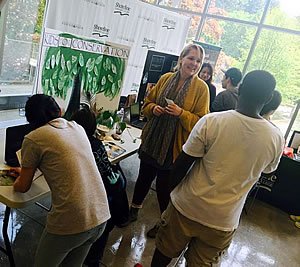 |
| Photo: Dr. Jolina Ruckert and students |
Dr. Jolina Ruckert, a recent Ph.D. graduate in developmental psychology, and Xinglu Yao, a recent Psychology undergraduate honors graduate, hosted an adjoining exhibit on human interactions with nature that focused on children and conservation. At this exhibit visitors played a game that tested their knowledge about their local environment and asked them to reflect on their experiences in nature. Collectively, visitors developed a visual display of meaningful interactions they have in nature that they want to conserve, such as “feeling the sun’s heat on my face” and “the view at the top of a mountain.”
About 100 visitors engaged with the researchers at both exhibits and shared their thoughts and comments about these research topics during the two-hour event. One child visitor commented on the human-robot interaction research saying: “It’s really crazy but also kinda cool!” As an adult visitor noted after visiting both exhibits: “The kind of relationships we form with technology and nature is really a reflection of ourselves.”
Supplemental Reading:
Graduate Student in Social Psychology and Personality Awarded NSF Graduate Research Fellowhip
Linda Zou, a second year student in Social Psychology and Personality, was recently awarded an NSF Graduate Research Fellowship (GRF). Linda works with Social/Personality faculty member, Sapna Cheryan. A brief introduction of this NSF fellowship can be found in a previous newsletter article.
Let's start with the basics, where are you from and where did you complete undergrad/masters?
I'm originally Oklahoma, but most recently from Washington DC's white-washed suburban backyard. I got my BA in psychology from the College of William & Mary in Williamsburg, Virginia.
How did you wind up at UW/why did you apply here? What do you think about living in Seattle?
I really connected with the UW social faculty's research interests, and getting to live in Seattle was a major bonus.
What is your research interest and how did you get into it (what inspires/motivates you)?
Speaking broadly, my work addresses race relations in the U.S. Recently my work has been looking at the two major dimensions of subordination (inferiority and foreignness) that define the stereotypes, prejudice, and threats that different racial minority groups face.
How did you learn about your funding opportunity and tell us about the application/waiting process?
The process was awesome! j/k it was not, it was mega stressful. But applying for the NSF GRF is pretty much built into the social/personality training program. The fact that most students apply for this fellowship means that people know you're doing it, they give multiple rounds of generous and invaluable feedback, and they're understanding when it's all you can talk about for 3 months.
How did you feel when you learned that your application was accepted and that you will receive funding?
"?!?!?!?!?!!!!!!!!!!!!!!!!!!!!!!!!!!!"
Do you have any advice/tips/suggestions for others who may apply to this opportunity? About graduate study in general?
Be shameless about asking for help. Prepare to do many many, many rounds of revisions. Set concrete deadlines for yourself. And if you can find a research question that really excites you, that'll help you sell its merit and contribution convincingly to reviewers.
The last book and/or movie you saw and enjoyed?
MAD MAX: FURY ROAD!! Charlize Theron is a dream.
What you plan to do once you complete your PhD?
┐(´∀`)┌
Supplemental Reading:
- More information on the GRFP can be found online.
- Former graduate student in Social Psychology and Personality, Jennifer Wang (UW 2012), maintains a website devoted to tips and tricks to applying for fellowships, the NSF in particular. She successfully received an NSF and a U.S. Department of Education Jacob K. Javits fellowship, while in our graduate program.
- Assistance in applying to the NSF is provided by the UW Graduate School Fellowships and Assistantships Office.
- Grants and Funding Information Service (GFIS) through the UW Libraries.
Clinical Graduate Student Receives GO-MAP Diversity Dissertation Fellowship
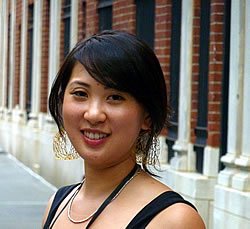 |
| Photo: Jessica Chen |
The University of Washington Graduate School Graduate Opportunities and Minority Achievement Program (GO-MAP) provides diversity fellowship support for students.While most of these opportunities are provided during admissions for recruiting new students, GO-MAP has a few awards for advanced students, such as their GO-MAP Dissertation Fellowship. The Psychology Graduate Program nominated Jessica Chen, a 7th year Adult Clinical student working with Ronald Smith, who received a Diversity Fellowship which provided a stipend and tuition exemption for her final two quarters residency in our department! This funding provided support while Jessica finalized and defended her dissertation prior to leaving to complete her required clinical internship.
Here are Jessica’s thoughts on being a GO-MAP fellow and being involved the University-wide GO-MAP community.
Let's start with the basics, where are you from and where did you complete undergrad/masters?
I'm from the Bay Area of Northern California. I completed my undergrad at Columbia University in New York City. Huh, where did I complete my masters...oh! Here!
How did you wind up at UW/why did you apply here? What do you think about living in Seattle?
I applied to UW because the clinical program here is exceptional and there were several faculty members whose research interests matched my own. It took me five years to really, really like Seattle, but now I love it. It's hard to imagine living anywhere else.
What is your research interest and how did you get into it (what inspires/motivates you)?
I am interested in making effective psychotherapies more efficient and accessible to all people, particularly those who have difficulty accessing care because of stigma, discrimination, or geography. This research interest has morphed over the course my graduate career. I started out doing research on treatments for PTSD, then began working with my current advisors on Internet-based interventions for stress. I'm inspired by the possibilities technology opens up in terms of disseminating evidence-based psychotherapy and I hope to continue working in this growing research field.
How did you learn about your funding opportunity and tell us about the application/waiting process?
I think my advisor saw a memo about it and forwarded it to me. I thought, "Why not?" I've always loved GO-MAP and their work on campus.
The application was pretty straightforward and short. I took a risk and made my personal statement very personal and honest, even though I worried it would come across the wrong way to others. I'm glad I was true to myself because it ended up working out!
The waiting process was difficult because months after my application was submitted there was no word on its outcome. About four months after I applied, I remember saying to Jeanny (Jeanny Mai, our outstanding Graduate Program Advisor), "I guess no news is bad news." Then suddenly, word came from GO-MAP that money was available and I was awarded a two-quarter dissertation fellowship!
How did you feel when you learned that your application was accepted and that you will receive funding?
AMAZING. It was such a surprise. I actually thought they might have sent the email in error. I made my husband read it to make sure it was my name and that it made sense, then I double checked with Jeanny because I didn't want to get my hopes up.
Do you have any advice/tips/suggestions for others who may apply to this opportunity? About graduate study in general?
I want to hype this award because it has been an amazing opportunity so far! This particular dissertation fellowship comes with a twice-monthly writing group of other awesome doctoral candidates in a variety of fields. They're all such interesting people who are passionate about what they do. Ralina Joseph (Associate Professor in the Department of Communication who runs the writing group) is incredible.
In terms of advice for applying to this opportunity, I would say that it worked out well for me to be thoughtful and honest in how I approach diversity issues in my personal life and in my research.
What do you hope to accomplish with the funding and/or while in the UW Psychology graduate program?
I hope to continue making connections with fellow graduate students and I really appreciate the opportunity to be mentored by faculty of color, because it is a different and unique experience. I hope to one day pay it forward.
Oh yeah, and I definitely hope to finish my dissertation this year!
What do you like doing in your spare time?
Playing with my son, who is going through a trucks and trains phase, and cooking or eating out with my husband.
The last book and/or movie you saw and enjoyed?
I read Gone, Girl this summer/fall and it was addictive! I'm also looking forward to the new Hunger Games movie. I'd like to watch it at the Big Picture downtown, where you can order food and drinks to your seat.
What you plan to do once you complete your PhD?
Clinical internship, then beyond!
Supplemental Reading:
- Alcor introduction and2014 article (when Jessica received the ALCOR).
- Exu Anton Mates (Animal Behavior with Jim and Renee Ha) and Jose Ceballos (Cognition & Perception withChantel Prat) also received fellowship awards from GO-MAP and shared their experiences.
- Graduate Opportunities & Minority Achievement Program (GOMAP)
Support UW Psychology Graduate Students by donating.
Diversity Steering Committee Stays Busy During the Year
The Diversity Steering Committee (DSC) once again worked with the Graduate Psychology Action Committee (GPAC) to select speakers for a series of Rapid Research Talks during the Department’s annual graduate student recruitment weekend in February 2015. The DSC is grateful to four speakers who shared their research on diverse communities: Karen Chang (Social Psychology and Personality with Yuichi Shoda), Nicole Stettler (Child Clinical with Lynn Fainsilber Katz), Andy Paves (Adult Clinical with Mary Larimer), and Yuichi Shoda (Social Psychology & Personality). The speakers covered a broad range of topics. Karen spoke about her work on how Asian Americans navigate sometimes conflicting cultural values. Nicole discussed her dissertation research on the importance of emotion regulation and parenting for sexual minority youth. Andy presented data on the mental health of the Filipino-American diaspora. Dr. Shoda shared recent findings demonstrating the need to better educate college students about the nature of racial differences.
The DSC also organized several opportunities for conversations about contemporary issues related to race and diversity in America. In the fall quarter, several DSC members and other faculty and graduate students in the Psychology Department came together to participate in an open dialogue about Ferguson, Mike Brown, and Eric Garner. Attendees were able to share their reactions to current events related to police brutality and race as well as discuss what psychology can uniquely contribute to these conversations. In the winter quarter, the DSC organized a trip to watch the movie "Selma," which portrays the United States in 1965, during a crucial period of the civil rights movement.
With the help of Carrie Perrin (Undergraduate Psychology Advising), the DSC also continued its annual diversity climate survey for undergraduates within the Psychology Department. They launched a similar diversity survey to understand the experiences and concerns of Psychology graduate students. A primary theme from the qualitative responses involved the negative experience of microaggressions in the classroom. In digesting the survey data, the DSC has been exploring different ways to provide opportunities for conversations in the department about experiences of microaggressions and how to think through them as receivers, perpetrators, and witnesses.
One of the DSC’s first efforts toward this goal was to invite Dr. Geneva Gay from the College of Education to give a presentation titled, "Power, Privilege, and Difference: Dealing with Microaggressions in the Classroom." Dr. Gay spoke in the first-year graduate student Proseminar at the end of the spring quarter. This session was open to graduate students of all years and department faculty as well. Dr. Gay engaged the group in a discussion about how people can be held responsible for the microaggressions they commit, giving tips for how to avoid microaggressions and how to create productive learning environments and repair relationships when we perpetrate or witness microaggressions.
Supplemental Reading:
- Articles on the students who completed the Specialization in 2010, 2011, Summer 2012, Winter 2012, Summer 2013, Winter 2013, Summer 2014.
- Diversity Science Specialization program requirements (only available to currently enrolled Psychology Graduate Students)
Graduate Accomplishments
Autumn 2014
Teri Kirby (Social Psychology & Personality with Tony Greenwald and Cheryl Kaiser) was approved for the Diversity Science Specialization, which is no surprise since Teri has been active in diversity research and is co-chair to our Diversity Steering Comittee. She has been previously featured for her NSF-supported research here. Congrats, Teri!
Two students completed their general exams and advanced to candidacy during Autumn 2014 quarter. Congratulations to Nicole Stettler (Child Clinical with Lynn Fainsilber Katz) and Kayla Upshaw (Developmental with Jessica Sommerville)!
Four students earned a Master's degree and we look forward to them continuing towards the Ph.D.: Liz Bird (Adult Clinical with William George), Sarah Faegre (Animal Behavior with Renee Ha), Natalia Garcia (Adult Clinical with Lori Zoellner), Carol Xu (Animal Behavior with Renee Ha).
Heather Gary (Developmental with Peter Kahn, Jr.) graduated with a Ph.D. after successfully defending her dissertation, "Adults' attributions of psychological agency, credit, and fairness to a humanoid social robot." Heather is working at Youtube.
Winter 2015
Laura Brady (Social Psychology & Personality with Cheryl Kaiser) earned BOTH the Quantitative Minor and Diversity Science Specialization this quarter. Wow! Laura has been featured in our newsletter for her NSF-funded research.
Several students completed their general exams and advanced to candidacy in Winter. A huge congratulations to Laura Brady (Social Psychology & Personality with Cheryl Kaiser), Sarah Faegre (Animal Behavior with Renee Ha), Libby Marks (Adult Clinical with Lori Zoellner), Jenn Staples (Adult Clinical with William George), Helen Valenstein-Mah (Adult Clinical with Mary Larimer), Emma Wampler (Cognition & Perception with Lee Osterhout), and Carol Xu (Animal Behavior with Renee Ha).
The Psychology Department awarded Master of Science (MS) degrees to Sarah Edmunds (Child Clinical with Wendy Stone), Kyrill Gurtovenko (Child Clinical with Lynn Fainsilber Katz), Melanie Klein (Child Clinical with Liliana Lengua), Connor McCabe (Child Clinical with Kevin King), Sujean Oh (Behavioral Neuroscience with Sheri Mizumori), Frank Schwebel (Adult Clinical with Ronald Smith), Vasundhara Sridharan (Social Psychology & Personality with Yuichi Shoda), and Sianna Zielger (Social Psychology & Personality with Sapna Cheryan). Students who complete the optional masters are eligible to attend the campus-wide commencement ceremony in the spring.
Spring 2015
Ashley Ruba (Developmental with Betty Repacholi) won the "Best Poster Award" at the Society for Affective Science 2015 Annual Conference.
Jose Ceballos (Cognition & Perception with Chantel Prat) and Linda Zou (Social Psychology & Personality with Sapna Cheryan) recently received National Science Foundation Graduate Research Fellowships! Jose was highlighted in a recent article for his McNair fellowship-supported research on language. Linda's research profile is in this issue of our newsletter.
Charlotte Heleniak (Child Clinical with Katie McLaughlin) received a Doris Duke Fellowship for the Promotion of Child Well-Being, our first ever! We profiled her research in light of this new award and you can read about it here.
Eight clinical graduate students were matched to internship sites for the upcoming year. The internship sites vary from Veterans Affairs offices in Seattle and Pittsburgh, to New Mexico, UCLA, and Harvard! Best wishes to Jessica Chen (Adult Clinical with Ronald Smith), Hollie Granato (Adult Clinical with William George), Alissa Jerud (Adult Clinical with Lori Zoellner), Joy Kawamura (Child Clinical with Lynn Fainsilber Katz), Lyndsey Moran (Child Clinical with Liliana Lengua), Karen Pang (Child Clinical with Elizabeth McCauley (Seattle Children's Hospital) and Lynn Fainsilber Katz), Andy Paves (Adult Clinical with Mary Larimer), and Stephanie Thompson (Child Clinical with Liliana Lengua)!
More Spring quarter milestones will be covered in our Winter 2015 issue. Please stay tuned!